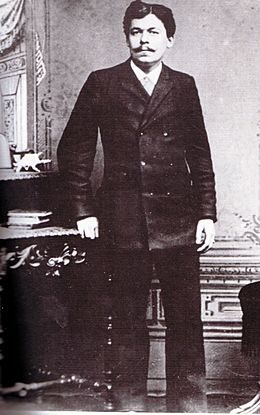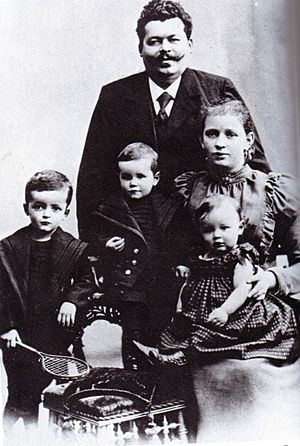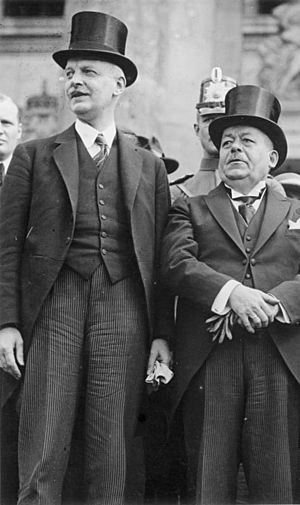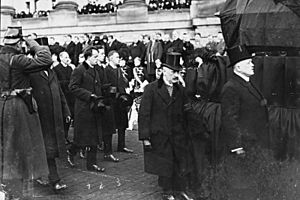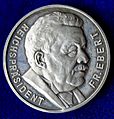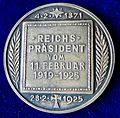Friedrich Ebert facts for kids
Quick facts for kids
Friedrich Ebert
|
|
|---|---|
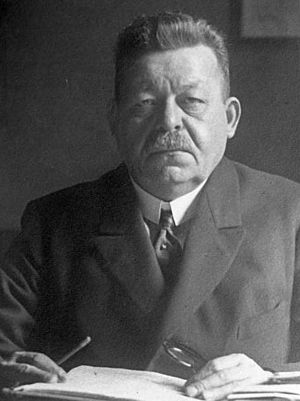
Ebert in 1925
|
|
| President of Germany | |
| In office 11 February 1919 – 28 February 1925 Serving with
|
|
|
Minister President
(1919) |
Philipp Scheidemann Gustav Bauer |
|
Chancellor
(1919–1925) |
|
| Preceded by | Wilhelm II (as Emperor) |
| Succeeded by | Paul von Hindenburg |
| Head of government of Germany | |
| De facto 9 November 1918 – 13 February 1919 |
|
| Preceded by | Max von Baden (as Chancellor) |
| Succeeded by | Philipp Scheidemann (as Minister President) |
| Leader of the Social Democratic Party | |
| In office 20 September 1913 – 15 June 1919 |
|
| Preceded by | August Bebel |
| Succeeded by |
|
| Member of the Reichstag for Düsseldorf 2 |
|
| In office 7 February 1912 – 9 November 1918 |
|
| Preceded by | Friedrich Linz |
| Succeeded by | Constituency abolished |
| Personal details | |
| Born | 4 February 1871 Heidelberg, Grand Duchy of Baden, German Empire |
| Died | 28 February 1925 (aged 54) Berlin, Weimar Republic |
| Political party | Social Democratic Party |
| Spouse |
Louise Rump
(m. 1894) |
| Children | 5, including Friedrich Jr. |
| Signature |  |
Friedrich Ebert (born February 4, 1871 – died February 28, 1925) was an important German politician. He was a member of the Social Democratic Party of Germany (SPD). He became the first president of Germany in 1919 and served until his death in 1925.
Ebert became the leader of the SPD in 1913. When World War I started in 1914, he supported Germany's war efforts. He believed in the Burgfrieden, a policy where political parties put aside their disagreements during wartime. This was to focus all efforts on winning the war.
Ebert played a key role in the German Revolution of 1918–19. After World War I, Germany became a republic, and he became its first chancellor. His main goals were to bring peace and order back to Germany. He also wanted to stop extreme left-wing groups. To do this, he worked with conservative and nationalistic groups, including the military and right-wing Freikorps (volunteer corps). With their help, Ebert's government stopped many uprisings from both the left and the right, like the Kapp Putsch. Because of these actions, he is seen as a controversial figure in history.
Contents
Friedrich Ebert's Early Life
Friedrich Ebert was born in Heidelberg, Germany, on February 4, 1871. He was the seventh of nine children. His father was a tailor. Friedrich wanted to go to university, but his family did not have enough money. Instead, he trained to be a saddle-maker from 1885 to 1888.
In 1889, after finishing his training, he traveled around Germany as a journeyman. This was a German custom to learn more about his trade. In Mannheim, he joined the Social Democratic Party (SPD). Ebert was interested in improving workers' lives, not just political ideas. Because of his political activities, the police kept a "black list" with his name. This made him move often.
In 1891, Ebert settled in Bremen. He worked odd jobs and, in 1893, became an editor for a socialist newspaper. In 1894, he married Louise Rump, who was also active in union work. He then owned a pub that became a meeting place for socialists. He was elected chairman of the Bremen SPD. In 1900, he became a trade-union secretary and a member of the Bremen city council. In 1905, he became the Secretary-General of the SPD and moved to Berlin. He was the youngest member of the party's executive committee.
Ebert ran for parliament (the Reichstag) several times. In 1912, he was elected for the Elberfeld-Barmen area. In this election, the SPD became the strongest party in the Reichstag. When August Bebel, the party chairman, died in 1913, Ebert was elected as the new joint party chairman.
World War I and Political Divisions
When World War I began in August 1914, Ebert supported war loans. He believed the war was a necessary defense, especially against Russia. In 1916, his co-chairman, Hugo Haase, resigned. Under Ebert's leadership, the SPD supported the Burgfrieden. This was an agreement among parties to put aside political differences during the war.
This stance caused a split in the SPD. Those who strongly opposed the war left in 1917 to form the USPD. Ebert believed in a compromise peace, not gaining new territories through war. However, he supported the overall war effort as a defensive struggle. Ebert suffered personal loss during the war; two of his four sons were killed.
In January 1918, workers in Berlin's munition factories went on strike. Ebert joined the strike leaders but worked hard to get the workers back to their jobs. Some extreme left politicians called him a "traitor to the working class." But many, including Kaiser Wilhelm II, saw him as a hero for helping to end the strike peacefully.
The German Revolution of 1918–19
Germany's Shift to a Republic
As World War I continued, it became clear that Germany would lose. In late 1918, the military leaders decided to transfer power to the parties in the Reichstag. This was to shift the blame for the defeat to the politicians.
On September 29, 1918, military leader Erich Ludendorff said that Germany needed a ceasefire quickly. He suggested that a new government, supported by the Reichstag, should ask for it. Ebert convinced his SPD party to join this new government. In early October, Prince Maximilian of Baden became chancellor. For the first time, SPD members like Philipp Scheidemann joined the government.
However, American President Wilson seemed to suggest that Germany's changes were not enough, especially because Kaiser Wilhelm II was still head of state. Ebert did not want to get rid of the monarchy, but he worried about a socialist revolution. On October 28, the German constitution was changed. This made the chancellor responsible to the Reichstag, not the emperor.
The November Revolution
The new government's plans were disrupted by a naval uprising in Wilhelmshaven on October 30. This started the German Revolution of 1918–19. On November 7, the SPD demanded that the Emperor and Crown Prince give up their thrones. Ebert told Prince Maximilian, "If the Kaiser does not abdicate, the social revolution is inevitable."
On November 9, the revolution reached Berlin. A general strike began, supported by the SPD. Workers' and soldiers' councils were formed. As crowds marched, the SPD resigned from Prince Maximilian's government.
Prince Maximilian could not convince Emperor Wilhelm II to step down. So, Maximilian announced that Wilhelm had given up both his imperial and Prussian titles. Soon after, Ebert asked Prince Maximilian to hand over the government to him. Maximilian resigned and gave his office to Ebert. Ebert became Chancellor of Germany and Minister President of Prussia. He was the first socialist and the first common person to hold these offices.
Ebert's first action was to ask people to stay calm. But it did not work. Later that day, Philipp Scheidemann, without Ebert's full approval, proclaimed Germany a republic. Ebert was angry because he believed this decision should be made by an elected national assembly.
The Council of the People's Deputies
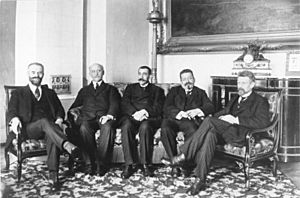
A provisional government, called the Council of the People's Deputies, was formed. It was made up of socialists. Ebert found himself in a difficult position. He had brought the SPD to power, but now had to share it with more extreme left-wing groups. On November 9, he reluctantly asked the USPD to join the government.
On November 10, the SPD, led by Ebert, ensured that most of the newly elected workers' and soldiers' councils supported them. The USPD agreed to share power in the Council of the People's Deputies. Ebert and Hugo Haase (from the USPD) became joint chairmen. That same day, Ebert received a call from General Wilhelm Groener, who offered the military's support. Groener asked Ebert to fight against communism, end the workers' and soldiers' councils, and restore order. This agreement became known as the Ebert–Groener pact.
Under Ebert's leadership, the Council of the People's Deputies quickly introduced social reforms. These included unemployment benefits, the eight-hour workday, and voting rights for everyone over 20. They also improved old-age, sick, and unemployment benefits for workers. Other changes included ending censorship, ensuring freedom of the press, and giving amnesty to political prisoners. They also improved housing and protected workers from unfair dismissal.
Civil Unrest and Conflict
After the Council of the People's Deputies was formed, Ebert and the SPD leaders worked with conservative groups. They wanted to quickly end the challenge to the existing order from the workers' councils. On December 16, the congress of councils set the date for elections to the National Assembly for January 19, 1919. However, they also wanted the military to be under civilian control, which the military leaders did not accept.
Fighting broke out in Berlin on December 24. Members of the Navy occupied the chancellery. Ebert asked the military for help. The fighting ended, but the USPD members left the government on December 29. The next day, the Spartacists formed the Communist Party of Germany (KPD).
The week of January 5–12, 1919, is known as "Spartacus week." It was an attempt by Berlin workers to regain what they felt they had lost from the revolution. The USPD called for a protest, and hundreds of thousands gathered. Representatives from the USPD and KPD decided to try and overthrow Ebert's government. However, the military support they expected did not arrive. Ebert began negotiating but also prepared for military action. Gustav Noske was put in charge of the Freikorps (right-wing paramilitary groups). From January 9 to 12, these forces, on Ebert's orders, violently suppressed the uprising.
President of Germany
On February 11, 1919, Ebert was elected as the provisional president of the German Republic. He was sworn in as Reichspräsident on August 21, 1919. He was Germany's first democratically elected head of state. He was also the first common person, the first social democrat, and the first civilian to hold this position.
One of Ebert's first major tasks was dealing with the Treaty of Versailles. When the terms of the treaty were announced on May 7, 1919, Germans of all political views hated it. They called it a "Diktat" because Germany had to sign it without any negotiations. Ebert himself called the treaty "unrealizable and unbearable."
However, Ebert knew that Germany might not be able to refuse the treaty. He feared the Allies would invade if Germany did not sign. He asked military leaders if the army could fight if the war restarted. They said no. So, Ebert advised the National Assembly to approve the treaty, which they did on July 9.
The government continued to fight against communist and other socialist groups after Ebert became president. From January to May 1919, civil war continued in some parts of Germany. Ebert believed that since elections had shown support for democratic parties, the revolutionary forces no longer had a right to power. He and Noske used the Freikorps to restore order across the country.
In March 1920, during the right-wing Kapp Putsch, Ebert's government had to flee Berlin. But civil servants refused to work for the new government, and a general strike was called. This led to the collapse of the putsch. After it ended, striking workers in the Ruhr region refused to return to work. They challenged the government with weapons. The government sent troops to stop the Ruhr Uprising by force.
To avoid an election during a difficult time, the Reichstag extended Ebert's term as president until June 25, 1925.
As president, Ebert appointed moderate chancellors like Wilhelm Cuno and Hans Luther. He also used his broad powers under Article 48 of the Weimar constitution many times. This article allowed him to issue emergency decrees. For example, he used Article 48 to deal with the Kapp Putsch and the Beer Hall Putsch. He used these emergency powers 134 times by 1924.
After the civil war, Ebert tried to balance the political left and right. He aimed for a "policy of balance" between workers and business owners. This led to some challenges, like when the SPD accepted longer working hours without extra pay during the 1923 crisis.
Death
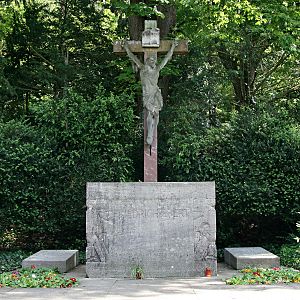
Ebert suffered from gallstones and frequent cholecystitis (gallbladder inflammation). He was often attacked by right-wing opponents, who spread false information about him. These attacks, sometimes supported by the courts, affected his health. In December 1924, a court fined a journalist who called Ebert a "traitor." However, the court also said that Ebert's actions during the 1918 strike could be seen as treason. These legal battles prevented him from getting medical help.
In mid-February 1925, Ebert became very ill. Doctors first thought it was the flu, then a gallbladder problem. On February 23, he became very septic (a serious infection). He had emergency surgery for appendicitis early the next day. Four days later, he died from septic shock at age 54.
Ebert was buried in Heidelberg. Many important politicians and a trade union leader spoke at his funeral. A Protestant minister, Hermann Maas, also spoke. This caused some controversy because Ebert was known to be an atheist, even though he had been baptized Catholic.
Friedrich Ebert Foundation
Ebert's approach to balancing political groups during the Weimar Republic is still important for the SPD. Today, the Friedrich Ebert Foundation is named after him. It is Germany's largest and oldest party-linked foundation. It supports students and promotes political education.
Some historians say Ebert's actions were necessary to prevent a communist state like the one proposed by Rosa Luxemburg and Karl Liebknecht. Other historians argue that organized communism was not very strong in Germany at that time. They believe Ebert's actions against the uprisings made workers more radical and increased support for communist ideas.
The Weimar constitution, which Ebert signed, allowed for workers' councils. However, these councils did not play a big role in the Weimar Republic. Ebert always believed that parliamentary democracy was the best way to express the will of the people. He thought workers' councils were only for a short time during the revolution. His party's slogan was "All power to all the people!" This was different from the far-left's slogan, "All power to the (workers') councils!"
Ebert believed that only reforms, not a revolution, could advance democracy and socialism. Because of this, some leftists called him a traitor, saying he helped pave the way for extreme right-wing groups. However, others argue that his policies saved Germany from extreme communist movements.
Images for kids
See also
 In Spanish: Friedrich Ebert para niños
In Spanish: Friedrich Ebert para niños
- Ebert–Groener pact
- President Friedrich Ebert Memorial


